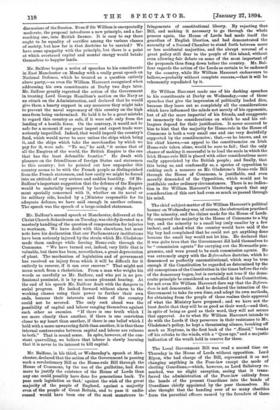Mr. Balfour's second speech at Manchester, delivered at the Christ
Church Schoolroom on Tuesday, was chiefly devoted to a masterly handling of the question of compensation for injuries to workmen. We have dealt with this elsewhere, but must note here his declaration that our Parliamentary institutions have been seriously injured by the strain which Mr. Gladstone made them undergo while forcing Home-rule through the Commons. " We have turned out, indeed, very little that is valuable, but there has been, nevertheless, a great depreciation of plant. The mechanism of legislation and of government has received an injury from which it will be difficult for it entirely to recover, if it can ever recover." That might not mean much from a rhetorician. From a man who weighs his words as carefully as Mr. Balfour, and who yet is no pro- fessional pessimist, it is by no means pleasant hearing. At the end of his speech Mr. Balfour dealt with the dangers to social progress. He looked forward without alarm to the working classes using their power to further their own ends, because their interests and those of the country could not be severed. The only rock ahead was the possibility of capital and labour ranging themselves against each other as enemies. "If there is one truth which I see more clearly than another, if there is one conviction closer to my heart than another, if there is one belief which I hold with a more unwavering faith than another, it is that these internal controversies between capital and labour are ruinous to both." That is sound sense. In spite, however, of the con- stant quarrelling, we believe that labour is slowly learning that it is never to its interest to kill capital.


















































 Previous page
Previous page